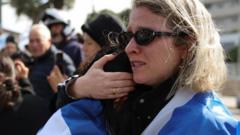The return of deceased Israeli hostages to Tel Aviv has sparked widespread sorrow and reflection among Israelis, facing the painful reality of loss. At the same time, Palestinians in Gaza express outrage over the body handover, highlighting the ongoing humanitarian crises and fractured narratives in the region.
Grief and Tension: The Troubling Return of Bodies in Israel

Grief and Tension: The Troubling Return of Bodies in Israel
In a poignant moment marked by mourning in Tel Aviv, the return of bodies of Israeli hostages unveils deep-seated tensions and contrasting narratives between Israelis and Palestinians amid ongoing conflict.
On a somber day in Tel Aviv, citizens gathered at Hostages Square to mourn the return of four bodies of Israeli hostages. This moment was imbued with political significance, as it unfolded against the backdrop of a long-standing conflict between Israel and Hamas, with hostages having been held for more than 500 days. The event began similarly to prior handovers, with Palestinian armed groups presenting the narrative of loss inflicted by Israel's military actions in Gaza.
The bodies of Oded Lifschitz, Shiri Bibas, and her two young sons, Ariel and Kfir, were presented in plain black coffins draped with Israeli flags, signaling a stark reminder of the personal toll of the conflict. While Hamas claimed these individuals were killed in airstrikes—a claim yet to be verified—the atmosphere was undeniably heavy with grief, as families faced the devastation of confirmed deaths amidst ongoing tension.
As Israelis mourned, the presence of the Red Cross underscored the delicate nature of the event, highlighting their request for a dignified process that sadly went unheeded. Instead, the ceremony was visibly political, filled with crowds that, although smaller due to the rain, displayed solidarity through Israeli flags and banners.
Inside the grieving crowd, families dealt with the anguish of lost loved ones. The personal stories painted a tragic picture, particularly for the family of Oded Lifschitz, who had long been one of the hostages. His son's poignant remark about the unresolved nature of the conflict—“we need to close this wound and move forward”—echoed the sentiment of many who wish for resolution amid grief.
Conversely, back in Gaza, feelings of resentment and bitterness boiled over as Palestinians confronted the disparity of attention that accompanied the handover. Many expressed anger that the remains of Israeli hostages were returned while countless Palestinian bodies, victims of the military campaign, lie buried in the rubble of Gaza. Activists reported that hundreds of Palestinian bodies have remained unaccounted for, some in cemeteries, leading to protests and further exacerbating the prevailing tensions.
The stark contrast between the mourning in Israel and the anger in Gaza reflects the deep divisions in perceptions of loss and justice in the conflict. While the return of the bodies enables closure for some Israeli families, it simultaneously starkly illustrates the ongoing humanitarian crisis faced by Palestinians, amplifying calls for recognition and retrieval of their own deceased.
The political implications of this moment are profound, further interweaving the personal stories of the bereaved, with the broader narratives surrounding the ongoing struggle for peace in the region. As the cycle of violence continues, both sides remain entrenched in their respective grievances, each side grappling with loss, memory, and the longing for resolution.




















